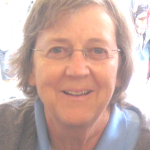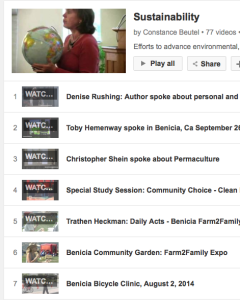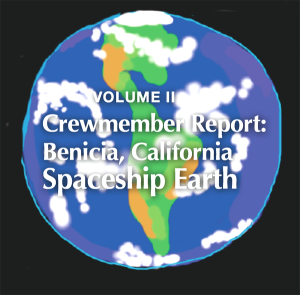 FOUR YEARS AGO, as part of a commitment I made as a commissioner of the then-newly formed Community Sustainability Commission, I began writing this weekly article, “Crewmember Report.” Looking back at my notes for my first Forum article, I talked about how I was inspired by my hero, R. Buckminster Fuller, and his lifelong work to make “the world work, for 100 percent of humanity, in the shortest possible time, through spontaneous cooperation, without ecological offense or the disadvantage of anyone.” This effort of “making the world work for everyone” isn’t just altruistic idea, but an essential effort given the changes in climate, and the pressures and depletions of our natural resources essential for life on Earth.
FOUR YEARS AGO, as part of a commitment I made as a commissioner of the then-newly formed Community Sustainability Commission, I began writing this weekly article, “Crewmember Report.” Looking back at my notes for my first Forum article, I talked about how I was inspired by my hero, R. Buckminster Fuller, and his lifelong work to make “the world work, for 100 percent of humanity, in the shortest possible time, through spontaneous cooperation, without ecological offense or the disadvantage of anyone.” This effort of “making the world work for everyone” isn’t just altruistic idea, but an essential effort given the changes in climate, and the pressures and depletions of our natural resources essential for life on Earth.
As of Tuesday I will have resigned from the commission after five years of service, and my weekly Crewmember Report to you will join me on sabbatical. I am so proud and grateful to have served with such collegial and engaged commissioners: Kathy Kerridge, educator and attorney, a true champion of Benicia’s sustainability and a moving force in advocating for the creation of this commission; Rae Lynn Fiscalini, architect and Master Gardener who completed her term of dedicated service last year along with Larry Lamoreux, Ph.D.; Emmalyn Tringali, Benicia High School student commissioner from 2010-11 and artist who was an enthusiastic and engaged youth advocate for sustainability; another Benicia High student, Leanza Tupfer (2011-12); business owner Bruce Barrow, a tremendously savvy and substantively contributing commissioner; business owner Anthony Shannon, deeply committed to community service; business owner Sharon Maher, a totally engaged proponent of intelligent sustainability; environmentalist Ershley Raj, a new member of the commission; and the commission’s bright and active current Benicia High student representative, Anavi Subramanyam.
The CSC is comprised of seven voting commissioners and four non-voting “ex officio” commissioners. The participation and input by the ex officio commissioners has been and is invaluable to the commission. The architects of the commission used such foresight and intelligence to have dedicated representation of the Good Neighbor Steering Committee, as represented by Marilyn Bardet; the Benicia Unified School District, as represented by Janice Adams (or alternate Michael Gardner); AMPORTS, as represented by Randall Scott; and Valero, as represented by Joe Muehlbauer.
The Herald
The staff of The Benicia Herald has my thanks and gratitude as well. Editor Marc Ethier and reporter Donna Beth Weilenman have informed our community and covered every commission meeting and event. They’ve also regularly published articles relating to sustainability via reports from the University of California-Davis and “Earth Talk” among other newsworthy items; and, of course, The Herald has published my Forum articles.
As an educator myself, I know that writing is thinking. This Crewmember Report platform has allowed me to research, explore and think about a wide range of sustainability related subjects.
Naturally and joyfully, I want to thank all the dedicated readers of my report. Many of you have taken the time to tell me you’ve read the articles, and I truly appreciate your comments.
What hasn’t changed
What surprised me when I started my work on the Community Sustainability Commission was the complexity of data gathering and the lack of comprehensive and current data from which to track and manage initiatives related to sustainability. I regret to report that very little has changed over the last five years. For example, you would think that information about chronic illness in our city is important and should be pretty easy to acquire. Certainly our Solano County Health Department could look up our ZIP, 94510, and report the statistics. It took me nearly five years, and the intercession of Mayor Elizabeth Patterson, to learn that Benicia has approximately 165 new cases of cancer annually (that seems like a lot of new cancer to me!) and something like 123 emergency room visits for asthma-related issues. Now, is this information we can just find and pick up off the county website? No — and what about coronary-related and other chronic illnesses?
Another example of some difficult (impossible?) data to gather would be the sale of gasoline in Benicia. Our city greenhouse gas (GHG) emissions report does gather estimated GHG from vehicles, but it is years in arrears — the 2010 report was published in 2013. I thought it might be possible to have an indicator of sorts by looking at the number of gallons of gas sold in Benicia. At least we would know, in a general way, if more or fewer gallons were being sold, which would give us a direction of purchasing behavior. Do you think you can easily get that information? Think again. I learned that oil companies consider that privileged information.
In this era of Big Data, I am really shocked at how little data is easily at hand for management and decision making at the local level.
What I’ve learned
For every seminar I’ve taught, whether at the undergraduate, graduate or doctoral level, I have always asked students to complete their final seminar work with a one-page summary of what they have learned. My thinking is that we don’t go through the engagement — maybe struggle — of learning for anyone else. We should engage in the “joy of learning” for ourselves.
What I have learned in writing this article and with the commission’s educational workshops, seminars, symposia and Clean Tech Expos is how critical and challenging the issues and decisions we face as a community are, and how much potential there is to not only meet these challenges but to leverage and thrive because of them. New developments are evident in energy, clean technology, transportation, local organic food production, water conservation and waste management, among other areas.
 I also know that I have changed personally over the last five years. The work on the commission was the direct catalyst for me to create a doctoral-level seminar titled “Education and Sustainability.” The work I began with Dr. Sue Maxam of Pace University continues as she is now teaching the seminar we created at Union Institute & University. Sue’s work at her own university has resulted in significant sustainability investment by Pace, and she and a colleague are launching linked seminars titled, “Current Issues in Peace, Justice and Sustainability.” Other doctoral students in education have gone on to make similar contributions in their communities across the country.
I also know that I have changed personally over the last five years. The work on the commission was the direct catalyst for me to create a doctoral-level seminar titled “Education and Sustainability.” The work I began with Dr. Sue Maxam of Pace University continues as she is now teaching the seminar we created at Union Institute & University. Sue’s work at her own university has resulted in significant sustainability investment by Pace, and she and a colleague are launching linked seminars titled, “Current Issues in Peace, Justice and Sustainability.” Other doctoral students in education have gone on to make similar contributions in their communities across the country.
Through the good works of Elena Karoulina and Benicia Community Gardens, I am now a happy subscriber to weekly boxes of locally produced organic fruits and vegetables. Last year, again through Benicia Community Gardens, I also learned about an important gardening process called permaculture.
I do know that being sustainable isn’t an abstract idea — it really is a formidable lifestyle and stewardship commitment. I know that contemporary life causes us to become somewhat mindless in many of our behaviors given the pressure and pace of life. Leaving an outdoor light on all night, or jumping in the car to drive a block or two, or using paper or plastic bags at the grocery store counter because the reusable bags are in the car — these are actions we often take because we’ve been overwhelmed with other things that must be done.
It’s interesting, though, to learn that by being mindful of the actions and decisions we make in favor of being sustainable doesn’t diminish in the least the quality of life or the results achieved. My organic fruit and food deliveries have enriched my diet and my health! Riding my electric bicycle around town is not only fun and terrific exercise, it has lowered my auto insurance, gas and maintenance costs; it allows me to really enjoy and connect with our beautiful community . . . and I never have to worry about a parking space! My home energy upgrades, LED lights, solar panels, etc. have saved energy, reduced my carbon footprint and — with life-cycle costs considered — will save me a significant amount of money. As I estimate it, these sustainability investments in my home will give me a far higher return via money in my pocket than the return on my financial portfolio.
If you’d like a Crewmember refresher
 In January 2013, I uploaded my first compilation of Crewmember Reports as an eBook available for a free download from iTunes. In January 2014, Volume II was sent into the ether on iTunes; and hopefully in the next month or so, Volume III will be ready for download. Thank you, Marc Ethier, for permission to collect and publish these articles.
In January 2013, I uploaded my first compilation of Crewmember Reports as an eBook available for a free download from iTunes. In January 2014, Volume II was sent into the ether on iTunes; and hopefully in the next month or so, Volume III will be ready for download. Thank you, Marc Ethier, for permission to collect and publish these articles.
So, once again, thank you! Thank you Mayor Patterson for your unfaltering support for making Benicia sustainable. Thank you City Council members for your stewardship and challenge. Thank you city staff, especially Gina Eleccion and Benicia Climate Action Plan Coordinator Alex Porteshawver. Finally, thank you readers and all those who have supported and continue to support the work of Benicia’s sustainability!
The work isn’t over and will not end. Torches on the commission are ready for you to pick up and carry on.
Constance
Learn more
• Benicia Sustainability 77 Videos: Available at youtube/cmbeutel
• Buckminster Fuller Institute: bfi.org
• Crewmember Report: iTunes free download, look for Constance Beutel
• E. O. Wilson, Life on Earth: iTunes free download
• KQED & Precourt Institute for Energy, Stanford ebooks: Free from iTunes — Energy; Clue into Climate: Causes of Change; Changing EcoSystems; Changing Water; Facing Our Future; Energy use and efficiency
• Sustainablebenicia.org
Constance Beutel is the former chair of Benicia’s Community Sustainability Commission. She is a university professor and videographer and holds a doctorate from the University of San Francisco.






Leave a Reply